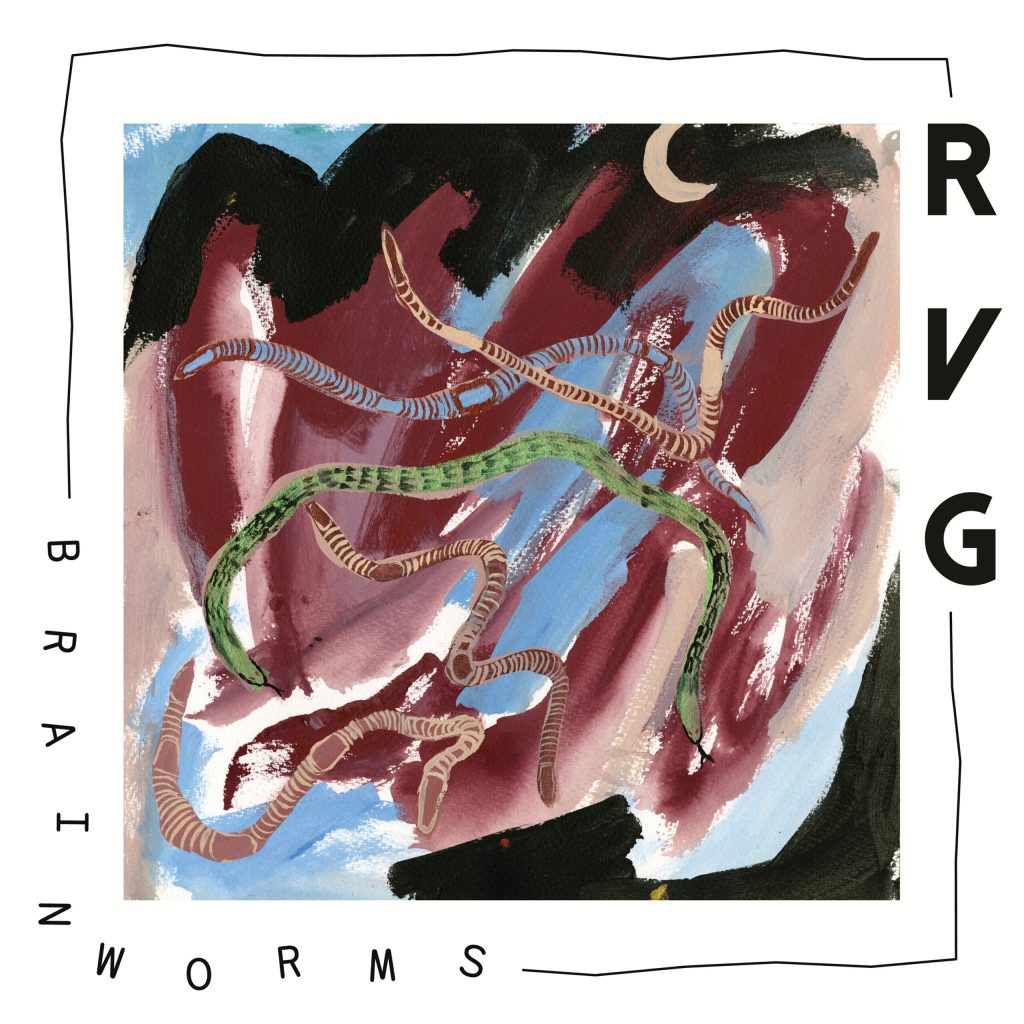
Introspective lyrics and genuine societal commentary can be a queasy cocktail to mix.
Led by Romy Vager, Melbourne-based band RVG have emerged as a master of both, particularly on 2020’s Feral which won over the critics with its sharp, chaotic wit and passionate songwriting. Their latest offering, Brain Worms, delves further into the recesses of the human psyche and pulls out the maggots of doubt, denial and fear that eat deep into our souls. With haunting melodies, thought-provoking lyricism, and an undeniable sense of authenticity, RVG takes us on a tour through the decaying tunnels that remain.
” I can try real hard to turn it around… but you don’t want me,” sings Vager on the opener ‘Common Ground’ and sets the tone. As her vocals soar over intricate guitar melodies, confronting the fractures between two people, it also illuminates the divide in society, urging us to soften a little and seek acceptance. Brittle things break, so right now the last thing we need is to be even tougher or give up. Our existence may even depend on it, as explored in ‘Midnight Sun’, an impassioned outcry against divisive politics and incompetence. Against a backdrop of tense instrumentation, Vager’s bitter lyrics excoriate the misplaced priorities of those in power during recent times of crisis. The song, originally written during the mishandling of 2019’s bushfires, sadly resonates for many other reasons, including the trivial distractions that reflect on a world in complete denial.
[embedded content]
Things take a more personal tone on ‘Tambourine’, the only explicitly covid-related song on here. Referencing Train‘s ‘Drops of Jupiter’, and with lines like “I don’t want to see you go as a tab on Google Chrome”, RVG expose the shock and feelings of helplessness when loved ones were lost during the lockdown. The song’s simplicity hides its more complex emotions which needle subtly under the skin, permanently etching their sentiment. The sweet ambiguity of the closing refrain “I wish I had’ve/hadn’t said I love you,” delivers a final sucker punch.
The title track provides a jump-start at the midpoint of the album. It’s a welcome change-up in tempo and Vager’s desperation is palpable as she is enveloped by a world that appears to have gone mad, completely absorbed by the lies of digital media. ‘You’re The Reason’ follows, the closest thing to a love song Brain Worms offers, and not as memorable in the squall of its neighbours. ‘Squid’ is both a standout track for its psychedelic leanings and notable for its unexpected narrative of being transported in time and to an alternate reality inhabited by squids: “Living in a squid-like misery, a squid job and a squid TV/Don’t go back in time, it’s not worth it”. Vager stretches the metaphor across nearly five minutes, laying out the absurdities of life with an infectious energy and self-belief that could have easily sounded ridiculous or pretentious in anothers’ hands. Waking from the cephalopod fever dream, ‘Giant Snake’ speaks to the nightmare that people who are different have to live through every day. Her commanding vocals traverse themes of alienation and the fear projected onto outsiders: “Death by a hundred million cuts/And not one killer you can pin this on.”
[embedded content]
The lead single ‘Nothing Really Changes’ Vager says “started off as a songwriting experiment to write something catchy with an obnoxious riff, a cross between Divinyls and ‘Smoke on the Water.‘ ” The song guides us into the album’s coda with its radio-friendly new wave synth and guitar finesse, Vager’s introspective lyrics exploring the complexities of missing someone while protecting oneself from emotional harm. The accompanying visuals (below) directed by Hayden Somerville capture a tension between misty-lensed 80s rock videos and the track’s true life melodrama.
The meticulous attention to detail in the production of Brain Worms, led by James Trevascus at London’s renowned Snap Studios, is evident throughout the album. While there are instances where the polish veers towards an overemphasis, compromising some of the desired grit and rawness, there are also moments, particularly on the closing tracks, where the glossy sheen becomes a prism, skillfully refracting the music’s vibrant hues and lush textures. Trevascus’s collaboration with RVG adds an intriguing and subtle layer of complexity to a band known for their straightforward approach. The album’s final track, ‘Tropic of Cancer,’ takes advantage of this softer approach, presenting a moment of reflection. Set against captivating guitar work, Vager begins wondering if becoming less compassionate is the answer to feeling bad all the time. The question prompts us to reconsider the courage it takes to remember our humanity; to forgive ourselves and break free from modern society’s dehumanising confines. As the lingering guitar slowly fades away, there’s a sudden rattle of tambourine calling us back to brighter days. It’s also perhaps a subtle reference to the earlier track, a reminder of our collective fragility.
Ultimately, Brain Worms speaks to RVG’s artistic evolution and is certainly their most confident-sounding release to date. Some fans might feel they’ve left something essential behind. Others may be disappointed there isn’t a more aggressive or daring exploration of the themes here. But that’s just the point Brain Worms is trying to make – we need more understanding, not more grandstanding. Without a doubt, RVG are as unapologetically honest and powerfully relevant as ever before.
[embedded content]
